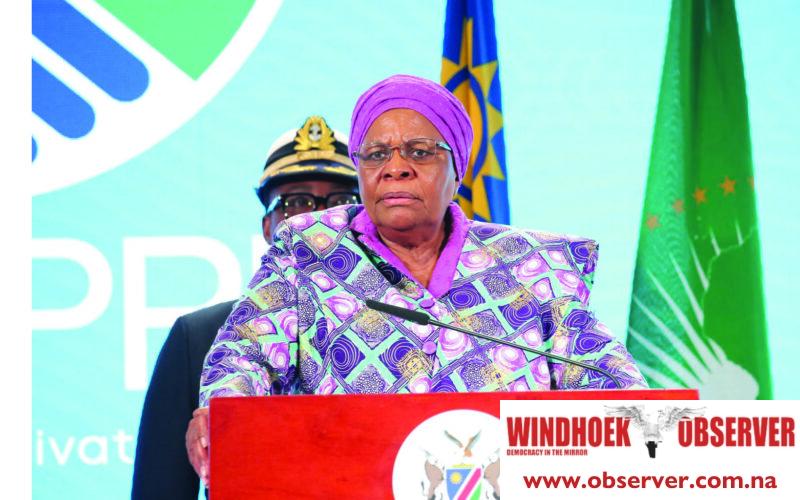By Allexer Namundjembo
President Netumbo Nandi-Ndaitwah has reaffirmed her administration’s ambitious goal of creating 500,000 jobs within five years, despite the government’s ongoing freeze on public service vacancies, a policy that continues to draw sharp criticism from the public and political commentators.
Speaking at the inaugural Namibia Public-Private Forum in Windhoek on Thursday, the President said her government was determined to drive “a new era of decisive, efficient, and results-driven governance” focused on economic growth, inclusivity, and employment.
The job creation pledge is anchored in the recently launched Sixth National Development Plan (NDP6), themed “Fostering Economic Growth, Inclusiveness, and Resilience for Sustainable Development.”
“Our goal is bold yet achievable, to create 500,000 jobs over the next five years,” she said. “While job creation may not rest solely with the government, it is our responsibility to create the environment in which businesses can grow and hire. This includes removing barriers, cutting red tape, and ensuring that enterprise thrives.”
She added that the NDP6 identifies priority sectors such as agriculture, education, housing, youth empowerment, and creative industries as key engines of job creation, alongside enabling industries like mining, energy, and logistics.
However, the Office of the Prime Minister (OPM) has imposed a moratorium on the recruitment of new staff across all ministries, offices, and agencies until 31 March 2026. Executive Director Gladice Pickering explained that the decision to freeze non-advertised positions in the public service was based on fiscal management considerations.
“The money will be finished at some point, then we have to wait for the next budget, and then we will continue filling. This is only for non-advertised positions. Many of them are still in the pipeline and they will be filled,” she said.
Public Service Commission Chairperson Salmaan Jacobs noted that freezing positions in the public service is not a new phenomenon, attributing it to ongoing budgetary constraints.
The number of positions affected by the freeze remains unclear, as each ministry is responsible for its own figures.
The freeze has left thousands of unemployed graduates and jobseekers frustrated, especially as the country’s unemployment rate continues to rise. Labour experts have warned that the policy undermines the government’s job creation commitments unless it is complemented by rapid private sector expansion.
Meanwhile, political voices from within the ruling party have also raised concern. Last week, SWAPO member and youth activist Stefanus Pombili told the Windhoek Observer that the freeze on vacant posts risks alienating young voters and deepening poverty among the majority.
“I believe we must be earnest and resolute as a nation. During elections, the SWAPO Party pledged job creation, and thus, young people rightfully expect employment opportunities, this is their immediate and most pressing need. Freezing vacant posts will not resonate well with the impoverished youth who are in desperate need of work,” Pombili said.
He warned that widespread youth unemployment could have severe social and political consequences if left unaddressed.
“Having a large population of poor and unemployed young people is akin to a ticking time bomb. What we are witnessing in other nations, where frustrated youth are determined to seize power, could easily manifest in Namibia,” he cautioned.
Pombili further acknowledged that financial constraints limit government action, noting that Namibia’s national debt, exceeding N$200 billion, about 70 percent of GDP, has hampered the rollout of youth employment schemes and infrastructure projects.
“Although Her Excellency President Netumbo Nandi-Ndaitwah is committed to ensuring equity and social justice, fiscal limitations are an undeniable obstacle,” he said. “We must therefore act prudently, especially in addressing poverty and hunger. Failure to do so could jeopardize our hold on political power.”
Despite such warnings, Nandi-Ndaitwah remains optimistic that collaboration with the private sector will drive employment growth.
Opposition parties in Namibia have been vocal about the pressing issue of youth unemployment, urging the government to take more decisive action.
In June, Popular Democratic Movement (PDM) parliamentarian Inna Hengari proposed the establishment of a Local Content Development Fund to bolster earnings in Namibia’s underfunded creative industry, aiming to sustain and create jobs for young people.
Similarly, the Landless People’s Movement (LPM) has been advocating for increased support for youth employment initiatives. In August, LPM youth leader Duminga Ndala highlighted the government’s budget allocation of N$257 million for the establishment of the National Youth Fund, a bold initiative aimed at tackling Namibia’s youth unemployment crisis.
These proposals reflect a growing concern among opposition parties regarding the high youth unemployment rate in Namibia, which stood at 44.4% in 2023 according to the NSA. Opposition leaders are calling for more targeted interventions to address this issue and provide sustainable employment opportunities for the youth.




